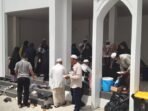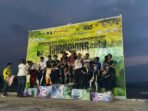by: Akhmad Lazuardi Saragih *)
Bung Karno, the nickname of Ir. Soekarno, was born on June 6, 1901 in Surabaya, East Java, with the real name Kusno Sosrodihardjo. His father was Raden Soekemi Sosrodihardjo and his mother was Ida Ayu Nyoman Rai. Soekarno was born from a blend of noble class from his father and Brahmin family from his devout mother.
Soekarno was the second child of Raden Soekemi Sosrodihardjo and Ida Ayu Nyoman Rai. He has one older sister named Raden Soekarmini. Initially, Soekarno was named Koesno Sosrodihardjo by his parents.
Quoting the inscription in the house where Soekarno was born, in Surabaya the following inscription is written; “At that time I was born, there was no one to hold me, except for a very old grandfather,” Bung Karno said. His father could not even afford to call a baby shaman to help his mother give birth.
At that time Surabaya, June 6, 1901, was the birthday of the Son of the Dawn named Soekarno. Bung Karno was born into poverty in a rented house on Jalan Pandean alley IV which is about 200 meters from the end of the alley. Being in the middle of a densely populated village, of course the house was very simple.
Still in the quotation of the inscription in front of the right and left sides of the front of the house where Bung Karno was born. Little Soekarno often experienced severe illness, so based on his father’s belief, the name Koesno was considered unsuitable for him and was changed to Soekarno, which was taken from the name of the greatest hero in the Mahabarata story “Karna”. “Soe” itself means good. So the name Soekarno means; “The Best Great Hero”.
In an excerpt from the text of Ir. Soekarno’s speech at the awarding of Doctor Honoris Causa in History at Padjajaran University Bandung, “…I was born in Soerabaja, so I am Arek Soerabaja…”
***
Reporting from the book Soekarno Hatta There are Similarities and Differences (1983) by Tamar Djaya, in 1907 Soekarno entered elementary school or folk school (SR) at that time, in Tulung Agung. He lived with his grandfather, Raden Hardjokromo.
Soekarno entered the world of politics at a very young age. Soekarno first became famous in 1915 when he became a member of Jong Java Surabaya Branch. Most organizations in Indonesia according to Soekarno are still Java-centric, only thinking about culture.
Soekarno spent his childhood moving around with his parents, following his father’s work placements. He began his formal education at elementary school in Mojokerto, where his father taught. His early education took place in an environment filled with strong values of nationalism and Javanese culture.
At the age of 14, Soekarno was sent to Surabaya to continue his education at Hoogere Burger School (HBS), a prestigious high school at that time.
In Surabaya, he lived with Haji Oemar Said Tjokroaminoto, a very influential figure in the national movement. Under Tjokroaminoto’s guidance, Soekarno became involved in political activities and the nationalist movement.
Living with Tjokroaminoto gave Soekarno access to a dynamic intellectual and political environment. He met many movement figures and began to understand the importance of the struggle for independence.
His education at HBS also introduced Soekarno to new ideas and strengthened his intellectual abilities, especially in the fields of engineering and politics.
Under the influence of Tjokroaminoto and the education he received, Soekarno began to develop his thoughts on nationalism and the independence movement. He was involved in various discussions and activities that focused on Indonesia’s independence from Dutch colonization.
***
Soekarno, as one of the founding fathers and the first president of Indonesia, was known for his deep love for the archipelago. In his various speeches and writings, he often expressed his love for his homeland and the people of Indonesia in a passionate and fiery manner.
Soekarno often emphasized the importance of a sense of unity among all Indonesians. In his speech, he invited all people to realize that Indonesia consists of various ethnicities, religions, and cultures, but remains one in the frame of the Unitary State of the Republic of Indonesia (NKRI).
For example, in his “Birth of Pancasila” speech on June 1, 1945, Soekarno articulated a vision of a united Indonesia, free from colonialism, and founded on principles that recognized diversity but prioritized unity.
Soekarno highly valued the cultural heritage and history of the Indonesian nation. He often reminded the importance of recognizing and respecting the history and culture of his own nation.
Soekarno loved the archipelago with a clear vision for an independent and sovereign future. He wanted an Indonesia that was not only politically independent, but also economically, with independence in various sectors.
One proof of Soekarno’s love for the archipelago was his efforts to empower the Indonesian people. He often spoke about the importance of education, health and welfare for all Indonesians.
Soekarno showed his love for the archipelago through his initiation of Pancasila, which became the foundation of the Indonesian state. He wanted all Indonesians to live in harmony and prosperity based on the five precepts.
In all his speeches, Soekarno used passionate and inspiring language, able to arouse a sense of pride and love for the country in the hearts of every listener.
His charismatic and fiery speech style made his every word about the archipelago more vivid and memorable in the memories of the Indonesian people. Such is the Dawn, continuing to break forth in our beloved archipelago.
*) Alumni of FISIP Lambung Mangkurat University









